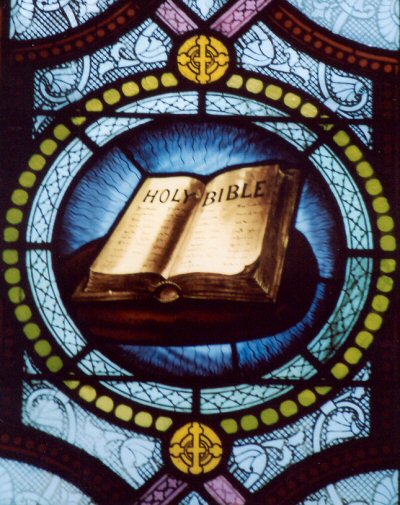
Liturgy of the Word
Third Sunday of Easter
May 4,
2014, Cycle A
White priestly vestments symbolize purity and integrity of the
life of faith.
Home Page
Liturgical
Year Cycle A 13-14
Introductory Acts Of Worship
The Entrance Prayers:
On Sunday, usually a hymn praising God
is sung in place of reciting a Psalm from the Bible which invites us to
enter more deeply into the mystery of God's love for us. The recited
weekday Psalm expresses a youthful heart and spirit, delighted that we may come
before the living God.
Entrance Song
/ Entrance Psalm (Antiphon)
Entrance Song
Psalm 65:1-2 Let all the earth cry
out to God with joy; praise the glory of his name; proclaim his glorious praise,
alleluia.
The Priest Approaches and Kisses the Altar: The altar is a symbol of Christ. In it are cut five crosses to recall the five wounds of Christ. The altar also represents the Church and has embedded in it the relics of her saints. The priest comes to the altar to celebrate the Sacrifice in the Church's name. Because of the glory surrounding the altar upon which the divine Sacrifice will be made, the kiss of the priest unites the Church to Christ, its Redeemer.
Priest:
In the name of the Father, and of the Son, and of the Holy Spirit.
All:
Amen.
The Greeting: We are welcomed in God's name. Our response unites us to our neighbor, to the priest and to God. (The priest may select from several forms of greeting).
Priest:
Grace to you and peace from God our Father and the
Lord Jesus Christ.
All:
And with your spirit.
The Penitential Prayers:
We recognize our guilt for past sins,
express our sorrow for them, and ask that Mary, the angels, the saints, and our
brothers and sisters in Christ pray for the Lord God's mercy. (The priest
may select from several forms).
Priest: Brothers and sisters, let
us acknowledge our sins, and so prepare ourselves to celebrate the sacred
mysteries.
Priest / All: I confess to almighty God and to you, my
brothers and sisters, that I have greatly sinned, in my thoughts and in my
words, in what I have done and in what I have failed to do, through my fault,
through my fault, through my most grievous fault; therefore I ask blessed Mary
ever-Virgin, all the Angels and Saints, and you, my brothers and sisters, to
pray for me to the Lord our God.
The Absolution:
Priest: May almighty God have
mercy on us, forgive us our sins, and bring us to everlasting life.
All:
Amen.
The Gloria: The Glory of God prayers have existed from the second century. They repeat the angels praise of God which heralded the birth of Christ on earth. Our praise is lifted again through the years as we rejoice at His coming as Lord, God, the most high Jesus Christ, who at Christmas took on our human nature while at the same time being the son of Man. This ancient hymn expresses our recognition of God's glory and love. It calls upon Christ as our holy and divine mediator, and the Holy Spirit who forever binds us together in God's love.
Priest and All: Glory to God in the highest, and on earth peace to people of good will. We praise you, we bless you, we adore you, we glorify you, we give you thanks for your great glory. Lord God, heavenly King, O God, almighty Father. Lord Jesus Christ, Only Begotten Son, Lord God, Lamb of God, son of the Father, you take away the sins of the world, have mercy on us; you take away the sins of the world, receive your prayer; you are seated at the right hand of the Father, have mercy on us. For you alone are the Holy One, you alone are the Lord, you alone are the most High, Jesus Christ, with the Holy Spirit, in the glory of God the Father. Amen.
The Collect: The priest lifts the united prayers and petitions of the congregation to God the Father through the merits of Jesus Christ in the Holy Spirit.
Priest: May your people exult for ever, O God, in renewed
youthfulness of spirit, so that, rejoicing now in the restored glory of our
adoption, we may look forward in confident hope to the rejoicing of the day of
resurrection. Through our Lord Jesus Christ, your son, who lives and
reigns with you in the unity of the Holy Spirit, one God, for ever and ever.

Liturgy of the Word
Christ is made known to us through the
Old Testament which prepares us to recognize Him. In those days, God
inspired men who spoke His message. Now, the New Testament Gospel reading
announces His presence to us directly through His Son. Both
readings bring God's message to us. Our responsibility is to respond.
The First Reading:
From the Old Testament
Priest/Reader: A reading from the
book, Acts of the Apostles.
First Reading: Acts 2:14, 22-23
Then Peter stood up with the Eleven, raised his voice, and proclaimed: “You who are Jews, indeed all of you staying in Jerusalem. Let this be known to you, and listen to my words. You who are Israelites, hear these words. Jesus the Nazarene was a man commended to you by God with mighty deeds, wonders, and signs, which God worked through him in your midst, as you yourselves know. This man, delivered up by the set plan and foreknowledge of God, you killed, using lawless men to crucify him. But God raised him up, releasing him from the throes of death, because it was impossible for him to be held by it. For David says of him: I saw the Lord ever before me, with him at my right hand I shall not be disturbed. Therefore my heart has been glad and my tongue has exulted, my flesh, too, will dwell in hope, because you will not abandon my soul to the netherworld, nor will you suffer your holy one to see corruption. You have made known to me the paths of life; you will fill me with joy in your presence.
“My brothers, one can confidently say to you about the patriarch David that he died and was buried, and his tomb is in our midst to this day. But since he was a prophet and knew that God had sworn an oath to him that he would set one of his descendants upon his throne, he foresaw and spoke of the resurrection of the Christ, that neither was he abandoned to the netherworld nor did his flesh see corruption. God raised this Jesus; of this we are all witnesses. Exalted at the right hand of God, he received the promise of the Holy Spirit from the Father and poured him forth, as you see and hear.”
Priest/Reader:
The Word of the
Lord.
All:
Thanks
be to God.
The Responsorial Psalm:
This Psalm praising God, is a prayer to God,
or recommends the practice of virtue. It is sung as an interlude between
the scriptural readings. It provides yet another instructional setting and
invites the assembly to imitate the cantor who sings a repeated response to the
verses of an ancient Psalm many of which are attributed to King David. The
verses are sung first by a cantor (song leader) accompanied by instruments, the
refrain is sung by the people.
Psalm 16:1-2, 5, 7-8, 9-10, 11
Cantor: Lord, you will show us the path of life.
All: Lord, you will
show us the path of life.
Cantor: Keep me, O God, for in you I take refuge; I say to the
Lord, “My Lord are you.” O Lord, my allotted portion and my cup, you it is who
hold fast my lot.
All: Lord, you will
show us the path of life.
Cantor: I bless the Lord who counsels me; even in the night my
heart exhorts me. I set the Lord ever before me; with him at my right hand I
shall not be disturbed.
All: Lord, you will
show us the path of life.
Cantor: Therefore my heart is glad and my soul rejoices, my
body, too, abides in confidence; because you will not abandon my soul to the
netherworld, nor will you suffer your faithful one to undergo corruption.
All: Lord, you will
show us the path of life.
Cantor: You will show me the path to life, abounding joy in your
presence, the delights at your right hand forever.
The Second Reading: Taken from the New Testament, often from a letter written by St. Paul.
Second Reading: 1 Peter 1:17-21
Beloved: If you invoke as Father him who judges impartially according to
each one’s works, conduct yourselves with reverence during the time of your
sojourning, realizing that you were ransomed from your futile conduct, handed on
by your ancestors, not with perishable things like silver or gold but with the
precious blood of Christ as of a spotless unblemished lamb.
He was known before the foundation of the world but revealed in the final time for you, who through him believe in God who raised him from the dead and gave him glory, so that your faith and hope are in God.
The Alleluia: An ancient expression of joy anticipating the Lord's message we will hear in the Gospel.
Luke 24:32
Cantor: Alleluia!
Alleluia! Alleluia!
All:
Alleluia! Alleluia! Alleluia!
Cantor: Lord Jesus, make your word plain to us, make
our hearts burn with love when you speak.
All:
Alleluia! Alleluia! Alleluia!
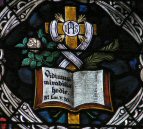 The Gospel:
The Liturgy of the Word is completed
by the reading of the Gospel. Before its reading, the members of the
assembly trace the sign of the cross upon the forehead to indicate their mental
acceptance of the Truth, on the lips to indicate their readiness to announce it,
and over the heart to indicate their sincere desire to accept it into their
lives. The "Good News" of the Gospel tells that God's kingdom has come for
all to hear, accept, and announce to the world for its salvation. It
is God who is speaking to us. Christ comes to teach us by the example of
His life and by His own words.
The Gospel:
The Liturgy of the Word is completed
by the reading of the Gospel. Before its reading, the members of the
assembly trace the sign of the cross upon the forehead to indicate their mental
acceptance of the Truth, on the lips to indicate their readiness to announce it,
and over the heart to indicate their sincere desire to accept it into their
lives. The "Good News" of the Gospel tells that God's kingdom has come for
all to hear, accept, and announce to the world for its salvation. It
is God who is speaking to us. Christ comes to teach us by the example of
His life and by His own words.
Priest: Cleanse my heart and my lips, almighty God, that I may worthily proclaim your
holy Gospel. Through the words of the Gospel may our sins be wiped away.
Priest: The Lord be with you.
All: And
also with you.
Priest/Deacon: A
reading from the holy Gospel according
to Luke.
All: Glory
to you, Lord.
The Gospel: Luke 24:13-35
Written to explain that
Christ came to save everyone
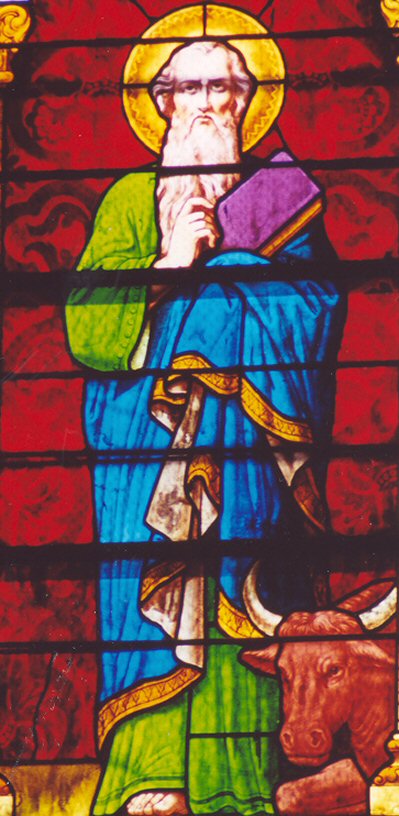 That
very day, the first day of the week, two of Jesus’ disciples were going to a
village seven miles from Jerusalem called Emmaus, and they were conversing about
all the things that had occurred. And it happened that while they were
conversing and debating, Jesus himself drew near and walked with them, but their
eyes were prevented from recognizing him. He asked them, “What are you
discussing as you walk along?” They stopped, looking downcast. One of them,
named Cleopas, said to him in reply, “Are you the only visitor to Jerusalem who
does not know of the things that have taken place there in these days?” And he
replied to them, “What sort of things?” They said to him, “The things that
happened to Jesus the Nazarene, who was a prophet mighty in deed and word before
God and all the people, how our chief priests and rulers both handed him over to
a sentence of death and crucified him. But we were hoping that he would be the
one to redeem Israel; and besides all this, it is now the third day since this
took place. Some women from our group, however, have astounded us: they were at
the tomb early in the morning and did not find his body; they came back and
reported that they had indeed seen a vision of angels who announced that he was
alive. Then some of those with us went to the tomb and found things just as the
women had described, but him they did not see.” And he said to them, “Oh, how
foolish you are! How slow of heart to believe all that the prophets spoke! Was
it not necessary that the Christ should suffer these things and enter into his
glory?” Then beginning with Moses and all the prophets, he interpreted to them
what referred to him in all the Scriptures. As they approached the village to
which they were going, he gave the impression that he was going on farther. But
they urged him, “Stay with us, for it is nearly evening and the day is almost
over.” So he went in to stay with them. And it happened that, while he was
with them at table, he took bread, said the blessing, broke it, and gave it to
them. With that their eyes were opened and they recognized him, but he vanished
from their sight. Then they said to each other, “Were not our hearts burning
within us while he spoke to us on the way and opened the Scriptures to us?” So
they set out at once and returned to Jerusalem where they found gathered
together the eleven and those with them who were saying, “The Lord has truly
been raised and has appeared to Simon!” Then the two recounted what had taken
place on the way and how he was made known to them in the breaking of bread.
That
very day, the first day of the week, two of Jesus’ disciples were going to a
village seven miles from Jerusalem called Emmaus, and they were conversing about
all the things that had occurred. And it happened that while they were
conversing and debating, Jesus himself drew near and walked with them, but their
eyes were prevented from recognizing him. He asked them, “What are you
discussing as you walk along?” They stopped, looking downcast. One of them,
named Cleopas, said to him in reply, “Are you the only visitor to Jerusalem who
does not know of the things that have taken place there in these days?” And he
replied to them, “What sort of things?” They said to him, “The things that
happened to Jesus the Nazarene, who was a prophet mighty in deed and word before
God and all the people, how our chief priests and rulers both handed him over to
a sentence of death and crucified him. But we were hoping that he would be the
one to redeem Israel; and besides all this, it is now the third day since this
took place. Some women from our group, however, have astounded us: they were at
the tomb early in the morning and did not find his body; they came back and
reported that they had indeed seen a vision of angels who announced that he was
alive. Then some of those with us went to the tomb and found things just as the
women had described, but him they did not see.” And he said to them, “Oh, how
foolish you are! How slow of heart to believe all that the prophets spoke! Was
it not necessary that the Christ should suffer these things and enter into his
glory?” Then beginning with Moses and all the prophets, he interpreted to them
what referred to him in all the Scriptures. As they approached the village to
which they were going, he gave the impression that he was going on farther. But
they urged him, “Stay with us, for it is nearly evening and the day is almost
over.” So he went in to stay with them. And it happened that, while he was
with them at table, he took bread, said the blessing, broke it, and gave it to
them. With that their eyes were opened and they recognized him, but he vanished
from their sight. Then they said to each other, “Were not our hearts burning
within us while he spoke to us on the way and opened the Scriptures to us?” So
they set out at once and returned to Jerusalem where they found gathered
together the eleven and those with them who were saying, “The Lord has truly
been raised and has appeared to Simon!” Then the two recounted what had taken
place on the way and how he was made known to them in the breaking of bread.
Priest/Deacon: The Gospel of the Lord.
All: Praise
to you, Lord Jesus Christ.
The Priest's Sermon:
The priest develops, explains, and comments upon the Master's words,
so our minds may be
enlightened, and our
hearts enriched.
(A priestly reflection upon this Gospel)
Profession of Faith: We state in the Nicene Creed the principles of our faith in precise and definite terms.
All: We believe in one God, the Father Almighty, maker of heaven and earth, of all that is visible and invisible. I believe in one Lord Jesus Christ, the Only Begotten Son of God, born of the Father before all ages. God from God, Light from Light, true God from true God, begotten, not made, consubstantial with the Father; through him all things were made. For us men and for our salvation he came down from heaven, and by the Holy Spirit was incarnate of the Virgin Mary, and became man. For our sake he was crucified under Pontius Pilate, he suffered death and was buried, and rose again on the third day in accordance with the Scriptures. He ascended into heaven and is seated at the right hand of the Father. He will come again in glory to judge the living and the dead and his kingdom will have no end. I believe in the Holy Spirit, the Lord, the giver of life, who proceeds from the Father and the Son, who with the Father and the Son he is adored and glorified, who has spoken through the prophets. I believe in one, holy, catholic and apostolic Church. I confess one Baptism for the forgiveness of sins and I look forward to the resurrection of the dead and the life of the world to come. Amen.
General Intercessions:
We pray for the needs of the pope, civic
leaders, our own needs, those of others,
the sick, the dying, those who have died, the church, and the world.
The response of all to each intercession: Lord, hear our prayer.
All: Lord,
hear our prayer.
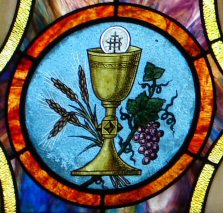 The Liturgy of the Eucharist
The Liturgy of the Eucharist
Gifts of bread and wine symbolizing ourselves are presented to the priest who will offer them to God the Father. Through the Holy Spirit, they will become the Body and Blood of Jesus Christ whom we receive in Holy Communion. Jesus unites Himself with us for our spiritual nourishment and strength. Today, when individuals do not present their own personal offerings of bread and wine, the monetary contribution symbolizes the material of their united sacrifice. The priest makes and offering of the bread and wine to God.
Preparation of the Bread and
Wine:
Priest: Blessed are you, Lord, God of all creation, through your goodness we have
this bread to offer, which earth has
given and human hands have made. It will become for us the bread of life.
All:
Blessed be God for ever.
Priest: By
the mystery of this water and wine may we come to share in the divinity of
Christ, who humbled himself to
share
in our humanity.
Priest: Blessed are you, Lord God of all creation, for through your goodness we have
received the wine we offer you;
fruit of the vine and work of human hands it will become our spiritual drink.
All: Blessed be God for ever.
Priest: Lord
God, we ask you to receive us and be pleased with the sacrifice we offer you
with humble and contrite hearts.
The Priest's Hands are Washed: This
act was traditionally necessary because the priest handled the various gifts
presented by the people. Now, the cleansing act using water reminds the
priest and ourselves of the need to cleanse not only the hands but the soul.
Soon, the priest's hands will hold the actual body of Christ, and we will become
His dwelling place.
Priest: Lord,
wash away my iniquity; cleanse me from my sin. Pray, brethren, that
my sacrifice and yours may be
acceptable to God, the almighty Father.
All: May the Lord accept the sacrifice at your hands, for the praise and glory of his
name, for our good, and the good
of all his holy Church.
Prayer over the Gifts: Speaking in our name, the priest asks the Father to accept the gifts we offer through him.
Priest: Receive, O Lord, we pray,
these offerings of your exultant Church, and, as you have given her cause for
such great gladness, grant also that the gifts we bring may bear fruit in
perpetual happiness. through Christ our Lord.
All: Amen.
Eucharistic Prayer: (Number One: The priest may select from several forms).
Priest: The Lord be with you.
All: And with your
spirit.
Priest: Lift up your hearts.
All: We lift them up to the Lord.
Priest: Let us give thanks to the Lord, our God.
All: It is right
and just.
Preface Prayer:
Priest: It is truly right and just, our duty and our salvation, at all times to acclaim you, O Lord, but on this day above all to laud you yet more gloriously, when Christ our Passover has been sacrificed. For he is the true Lamb who has taken away the sins of the world; by dying he has destroyed our death, and by rising, restored our life. Therefore, overcome with paschal joy, every land, every people exults in your praise and even the heavenly Powers, with the angelic hosts, sing together the unending hymn of your glory, as they acclaim:
Acclamation:
Priest and All: Holy, Holy, Holy Lord, God of power and might, Heaven and earth are full of your glory. Hosanna in the highest. Blessed is he who comes in the name of the Lord. Hosanna in the highest.
Priest: We come to you, Father, with praise and thanksgiving, through Jesus Christ your Son. Through him we ask you to accept and bless these gifts we offer you in sacrifice.
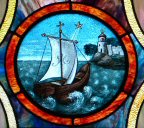 We
offer them for your holy catholic Church, watch over it, Lord, and guide it;
grant it peace and unity throughout the world. We offer them for _____ our
Pope, for _____ our bishop, and for all who hold and teach the catholic faith
that comes to us from the apostles.
We
offer them for your holy catholic Church, watch over it, Lord, and guide it;
grant it peace and unity throughout the world. We offer them for _____ our
Pope, for _____ our bishop, and for all who hold and teach the catholic faith
that comes to us from the apostles.
Remember, Lord, your people, especially those
for whom we now pray, _____ and _____. Remember all of us gathered here
before you. You know how firmly we believe in you and dedicate ourselves
to you. We offer you this sacrifice of praise for ourselves and those who
are dear to us. We pray to you, our living and true God, for our
well-being and redemption.
In union with the whole Church we honor Mary, the ever-virgin mother of
Jesus Christ our Lord and God. We honor Joseph, her husband, the apostles
and martyrs Peter and Paul, Andrew, James, John, Thomas, James, Philip,
Bartholomew, Matthew, Simon and Jude; we honor Linus, Cletus, Clement, Sixtus,
Cornelius, Cyprian, Lawrence, Chrysogonus, John and Paul, Cosmas and Damian and
all the saints. May their merits and prayers gain us your constant help
and protection. Through Christ our Lord. Amen.
Father, accept this offering from your whole family. Grant us your peace in this life, save us from final damnation, and count us among those you have chosen. Through Christ our Lord. Amen.
Bless and approve our offering; make it
acceptable to you, an offering in spirit and in truth. Let it become for
us the body and blood of Jesus Christ, your only Son, our Lord. Through
Christ our Lord. Amen.
The priest repeats the words which
Christ used at his Last Supper when He changed the bread into His Body and the
wine into His Blood. His Body and Blood are truly present but under the
appearance of bread and wine. The death of Christ is prolonged in each of those who receive Him worthily. We apply His
death to ourselves so that we may share His glory. This moment is the most solemn on earth because it is Divine act which enables
us to apply to ourselves the Cross which Christ willingly took upon Himself.
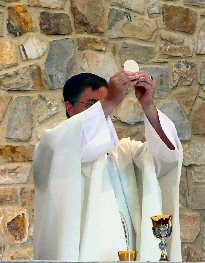 We are called to die to sin and
lift our very selves to God so that we become changed; to do as God would have
us do, to become what God would have us become. Our own little cross can
lift us into union with Christ's Cross so we may earn the joys of everlasting
happiness with God the Father.
We are called to die to sin and
lift our very selves to God so that we become changed; to do as God would have
us do, to become what God would have us become. Our own little cross can
lift us into union with Christ's Cross so we may earn the joys of everlasting
happiness with God the Father.
The
Lord's Supper:
The day before he suffered he took
bread in his sacred hands and looking up to heaven, to you, his almighty Father,
he gave you thanks and praise. He broke the bread, gave it to his
disciples, and said:
Take this, all of
you and eat of it: for this is my Body which will be given up for you.
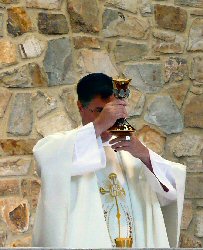 When
supper was ended, he took the cup. Again he gave you thanks and praise,
gave the cup to his disciples, and said:
When
supper was ended, he took the cup. Again he gave you thanks and praise,
gave the cup to his disciples, and said:
Take this, all of you, and drink from it; for this is the chalice of my Blood, the Blood of the new and eternal covenant; which will be poured out for you and for many for the forgiveness of sins. Do this in memory of me.
Memorial Acclamation: (The priest may
select from several forms).
Priest: Let us proclaim the mystery of faith:
Priest
and All: When we
eat this Bread and drink this Cup, we proclaim your Death, O Lord, until you
come again.
Memorial Prayer:
Priest: Father, we celebrate the memory of Christ, your Son. We, your people and your ministers, recall his passion, his resurrection from the dead, and his ascension into glory; and from the many gifts you have given us we offer to you, God of glory and majesty, this holy and perfect sacrifice: the bread of life and the cup of eternal salvation.
Look with favor on these offerings and accept them as once you accepted the gifts of your servant Able, the sacrifice of Abraham, our father in faith, and the bread and wine offered by your priest Melchisedech.
Almighty God, we pray that your angel may take this sacrifice to your altar in heaven. Then, as we receive from this altar the sacred body and blood of your Son, let us be filled with every grace and blessing. Through Christ our Lord. Amen.
Remember, Lord, those who have died and have gone before us marked with the sign of faith, especially those for whom we now pray, _____ and _____. May these, and all who sleep in Christ, find in your presence light, happiness, and peace. Through Christ our Lord. Amen.
For ourselves, too, we ask some share in the fellowship of your apostles and martyrs, with John the Baptist, Stephen, Matthias, Barnabas, Ignatius, Alexander, Marcellinus, Peter, Felicity, Perpetua, Agatha, Lucy, Agnes, Cecilia, Anastasia and all the saints. Though we are sinners, we trust in your mercy and love. Do not consider what we truly deserve, but grant us your forgiveness. Through Christ our Lord.
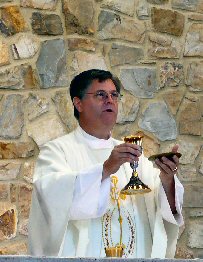 Through him you
give us all these gifts. You fill them with life and goodness, you bless
them and make them holy.
Through him you
give us all these gifts. You fill them with life and goodness, you bless
them and make them holy.
Doxology:
Prayer of Praise: Through him, with him,
and in him, in the unity of the Holy Spirit, all glory and honor is yours,
almighty Father, for ever and ever. Amen.
Communion Rite
In the Liturgy of the Eucharist, we
symbolically offer ourselves to the Lord through the gifts of bread and wine.
At the Consecration, we offer our very lives to be united the God the Father
through the Cross of Christ. In Communion, we find that we have not died
at all, but have come to life. We have surrendered ourselves to God
through His Divine Son, Jesus Christ. In return become ennobled and
enriched. We give up time and we get eternity, we give up our sin and we
receive grace, we surrender our self-will and receive the strength of the Divine
Will, we give up ourselves and we receive everything. For the Son of God
says to us that unless we receive Him we shall not have Divine life in us.
But it is not really we who receive Christ as it is Christ who receives us,
bringing us into Himself.
God makes His Cross the very means
of our salvation and our life. While we have crucified Him, His eternal
love cannot be extinguished. Christ willed to give us the very life we
crucified in our Redemption, the Consecration of Holy Thursday into Communion,
His death into our everlasting life.
The Lord's
Prayer:
Priest:
Let us ask our Father to forgive our sins and to bring us to forgive those
who sin against us.
Priest and
All: Our
Father, who art in heaven, hallowed be they name; Thy kingdom come; Thy will be
done on earth as it is in
heaven. Give us this
day our daily bread; and forgive us our trespasses as we forgive those who
trespass against us; and lead us not into temptation, but deliver us from evil.
Priest: Deliver us, Lord, we pray, from every evil,
graciously grant peace in our days, that, by the help of your mercy, we may be
always free from sin and safe from all distress, as we await the
blessed hope and the coming of our Savior, Jesus Christ.
All: For the kingdom, the power,
and the glory are yours, now and for ever.
Prayer for Peace:
Priest: Lord
Jesus Christ, you said to your apostles: I leave you peace, my peace I give you.
Look not on our sins, but on the faith
of your Church, and grant us peace and unity of your kingdom where you live for
ever and ever. Amen.
Priest: Let
us offer each other the sign of peace.
Breaking of the Bread:
Priest and All: Lamb of God, you take away the sins of the
world, have mercy on us.
Lamb of God, you take away the sins of the world, have mercy on us.
Lamb of God, you take away the sins of the world, grant us peace.
Priest: May this mingling of the body and blood of our Lord
Jesus Christ bring eternal life to us who receive it.
Communion of the Priest:
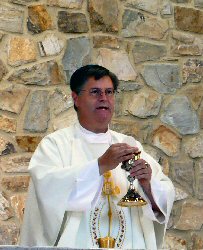 Priestly Preparation: May
the receiving of your Body and Blood, Lord Jesus Christ, not bring me to
judgment and condemnation, but through your loving mercy be for me protection in
mind and body and a healing remedy.
Priestly Preparation: May
the receiving of your Body and Blood, Lord Jesus Christ, not bring me to
judgment and condemnation, but through your loving mercy be for me protection in
mind and body and a healing remedy.
Priest: This is the Lamb of God who takes away the sins of the world. Happy are
those who are called to his supper.
Priest and All: Lord, I am not worthy to receive you, but only say the word and I shall be healed.
Priest: May the Body of Christ keep me safe for eternal life.
May the Blood of Christ keep me safe for eternal life.
Communion Antiphon:
Luke 24:35
Priest: The disciples recognized the Lord Jesus in the breaking
of the bread, alleluia.
Communion of the Faithful:
Priest:
The Body of Christ.
The Faithful: Amen.
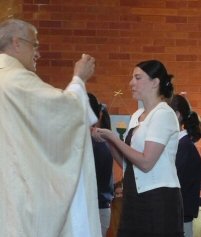
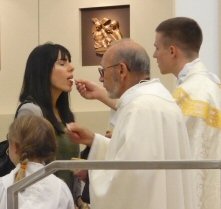
Priest/Deacon/
Extraordinary Eucharistic Minister:
The Blood of Christ.
The Faithful: Amen.
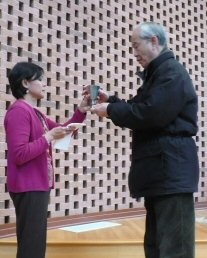
Cleansing of the Vessels:
Priest: Lord, may I receive these gifts in purity of heart. May they bring me healing and strength, now and for ever.
Prayer after Communion:
Priest: Let us pray.
Priest: Look with kindness upon your people, O Lord, and
grant, we pray, that those you were pleased to renew by eternal mysteries may
attain in their flesh the incorruptible glory of the resurrection. Through
Christ our Lord.
All: Amen.
Concluding Rite
Blessing:
Priest:
Bow your heads and pray for God's blessing.
Priest: May God, who by the Resurrection of his Only Begotten
Son was pleased to confer on you the gift of redemption and of adoption, give
you gladness by his blessing.
All: Amen.
Priest: May
he, by whose redeeming work you have received the gift of everlasting freedom,
make you heirs to an eternal inheritance.
All: Amen.
Priest: And may you, who have already risen with Christ in
Baptism through faith, by living in a right manner on this earth, be united with
him in the homeland of heaven.
All: Amen.
Priest: And may the blessing of almighty God, the Father, and
the Son, and the Holy Spirit, come down on you and remain with you for ever.
Dismissal Prayer:
Priest: Go in peace, alleluia, alleluia.
All: Thanks be to God,
alleluia, alleluia.
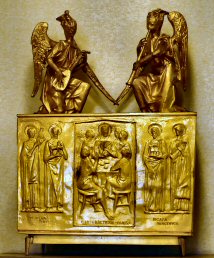 O my Jesus, forgive us our sins.
O my Jesus, forgive us our sins.
Save us from the fires of hell.
Lead all souls to heaven,
especially those in most need of your mercy.
www.Divinemasterplanforlife.com
www.Saintsnheaven.com
Top
Home Page
Liturgical
Year Cycle A 13-14